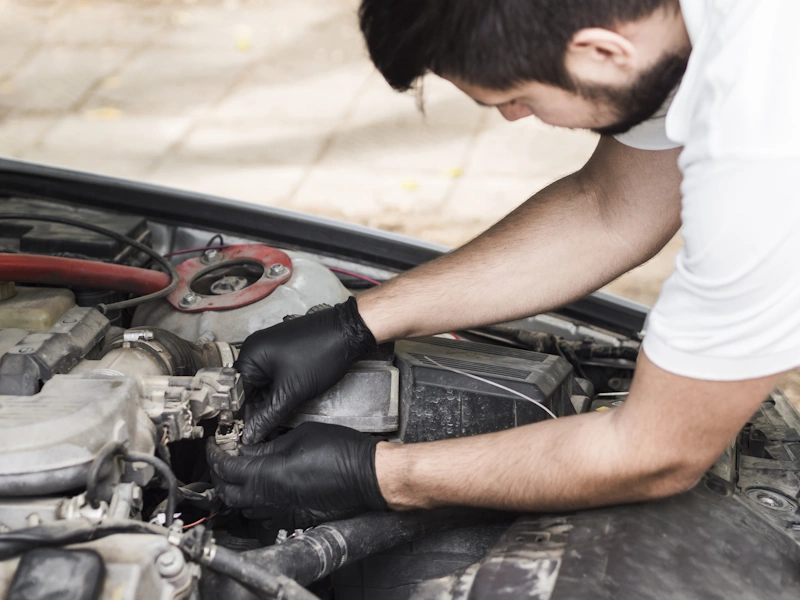What happens when an engine locked up? Experiencing engine locked up can be frustrating and worrisome for any vehicle owner. A locked-up engine occurs when the internal components seize, preventing the engine from turning over and starting. Several factors can contribute to an engine lock-up, including lack of lubrication, overheating, or mechanical failure.
In today’s technical blog, we will explore the common causes of engine lock-ups and provide a step-by-step guide on what to do when faced with this issue. Following these instructions can save you from unnecessary repair costs and get your vehicle back on the road.
Understanding the Causes of Engine Lock-Up
Lack of Lubrication: Insufficient lubrication can cause friction between the engine’s moving parts, leading to excessive heat and eventually resulting in engine locked up. This can occur due to low oil levels, failure, or contamination.
Overheating: Excessive heat can cause metal components to expand, leading to a loss of clearance between moving parts. If the temperature rises beyond the engine’s operational limits, it can result in severe damage and engine seizure.
Mechanical Failure: Several mechanical failures can contribute to an engine lock-up. This includes a broken timing belt, damaged connecting rods, seized pistons, or a failed crankshaft.
Initial Steps to Take
Safety First: When you encounter an engine locked up, ensure that you are in a safe location away from traffic. Engage the parking brake, turn off the ignition, and activate the hazard lights.
Check the Basics: Verify that there is an adequate fuel supply, the battery is charged, and the engine is not overheating due to a malfunctioning cooling system.
Assess Warning Signs: Reflect on any unusual noises, smoke, or warning lights before the engine locked up situation. This information will assist in identifying the potential cause of the issue.
Troubleshooting Steps
Confirm the Engine Locked Up: Attempt to turn the engine over using the ignition key. It is likely locked up if there is no response or the engine cannot rotate. Be cautious and avoid excessive force, as it can lead to further damage.
Inspect the Oil Level: Check the engine oil level using the dipstick. If it is significantly low or absent, it could be a sign of an oil leak or consumption, which may have caused the lock-up. Refill the oil if necessary, but avoid overfilling.
Investigate the Cooling System: Ensure that the cooling system is functioning correctly. Check the coolant level, radiator, hoses, and water pump for any signs of engine locked up and leaks. Repair or replace any faulty components.
Diagnose the Electrical System: Inspect the battery, starter motor, and alternator for proper functionality. Weak or dead batteries, faulty starters, or charging system issues can mimic an engine lock-up. Repair or replace any faulty electrical components.
Remove the Spark Plugs: Detach the spark plugs from the engine block. This step allows you to evaluate if there is any internal damage, such as hydraulic lock caused by coolant or fuel entering the combustion chamber.
Apply Penetrating Oil: If the engine lock-up persists, use a penetrating oil, such as WD-40 or PB Blaster, to loosen any seized components. Follow the manufacturer’s instructions and allow sufficient time for the oil to penetrate.
Rotate the Crankshaft: Using a wrench or socket, attempt to rotate the crankshaft in the average direction of engine rotation. Apply gentle and consistent force. If the crankshaft does not budge, it may indicate a severe mechanical failure requiring professional assistance.
Seeking Professional Assistance
When to Call a Mechanic: If you have followed the troubleshooting steps outlined in the article and there is persistence of symptoms of engine locked up, you should seek professional assistance. A trained mechanic will have the expertise and necessary tools to diagnose and repair complex engine issues.
Towing Considerations: If your vehicle is immobile due to an engine locked up, it may need to be towed to a repair shop. Understand the towing options available to you, such as flatbed towing, to ensure the safety of your vehicle during transportation.
Communicating the Problem: When contacting a mechanic, provide them with a detailed explanation of the symptoms leading up to the engine lock-up. This information can assist them in diagnosing the issue more efficiently.
Preventive Measures and Maintenance Practices
Regular Oil Changes: Engine lubrication is vital to prevent excessive friction and heat buildup. Adhere to the manufacturer’s recommended oil change intervals and use the appropriate oil viscosity for your vehicle.
Cooling System Maintenance: Ensure the cooling system is maintained correctly by checking coolant levels regularly and flushing the system as the vehicle manufacturer recommends. Inspect the radiator, hoses, and water pump for any signs of wear or leaks.
Timing Belt Replacement: If your vehicle is equipped with a timing belt, follow the manufacturer’s recommended replacement intervals. A broken timing belt can cause severe engine damage and lead to a lock-up.
Routine Inspections: Regularly inspect your vehicle for any signs of leaks, unusual noises, or warning lights. Addressing these issues promptly can prevent them from escalating into more significant problems.
Professional Inspections: Schedule periodic inspections with a qualified mechanic to identify potential issues before an engine lock-up occurs. They can thoroughly check the engine components, electrical systems, and other critical parts.
Key Takeaways
Experiencing engine locked up can be a daunting experience, but by following the troubleshooting steps outlined in this article, you can diagnose the issue and potentially resolve it yourself. Remember to prioritize safety, assess warning signs, and inspect critical components such as lubrication, cooling, and electrical systems. While some engine lock-ups may be resolved through these steps, others may require the expertise of a professional mechanic. In such cases, it is crucial to seek assistance to avoid further damage. By taking prompt action and understanding the underlying causes, you can minimize the impact of an engine lock-up and get your vehicle back on track efficiently and cost-effectively.
Now if your car has been causing too many problems and you would like to just sell it to save for another car, contact Hercules today!

